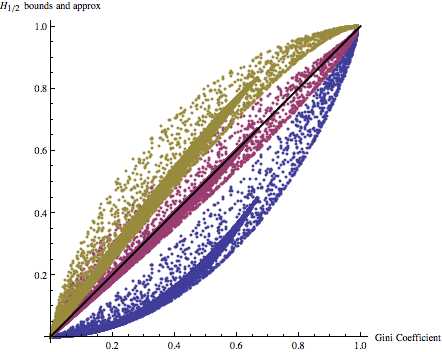Gini coefficient (aka Gini Index) is a quantity used in economics to describe income inequality. It is 0 for uniformly distributed income, and approaches 1 when all income is in hands of one individual.
For probabilities we have:
$$ G(\{p_i\}_{i\in\{1...n\}}) = \sum_{i=1}^n \frac{2i-n-1}{n}p_i, $$
where $p_i$ is a non-decreasing sequence, or in the continuous case:
$$ G(p) = \int_0^1 \left(1-2\int_0^xp(y)dy\right)dx = \int_0^1 (2x-1)p(x)dx $$ where probability density function $p(x)$ is non-decreasing.
As it is a measure of uniformness of a probability distribution, I was curious if it is possible to relate Gini coefficient to some Rényi entropy $H_q$ (for example, collision entropy $H_2$)? (Or Tsallis entropy $T_q$ as for the continuous case formulas are shorter.)
I got an upper bound
$$ G(p) \leq \sqrt{\tfrac{1}{3}(e^{-H_2(p)}-1)} = \sqrt{-\tfrac{1}{3}T_2(p)} $$ with Schwarz inequality for $(2x-1)$ and $(p(x)-1)$.
It works similarly for discrete probabilities:
$$ G(\{p_i\})\leq\sqrt{\tfrac{n}{3}}\sqrt{1-\tfrac{1}{n^2}}\sqrt{e^{-H_2(\{p_i\})}-\tfrac{1}{n}}. $$
Is there any non-trivial lower bound? That is, except for
$$G(p)\geq 1 - e^{H_0(p)} = -T_0(p),$$ $$G(\{p_i\})\geq 1 - \tfrac{1}{n}e^{H_0(\{p_i\})}.$$
Is there an upper bound that is saturated for $p = \{0,0,\cdots,0,1\}$?

